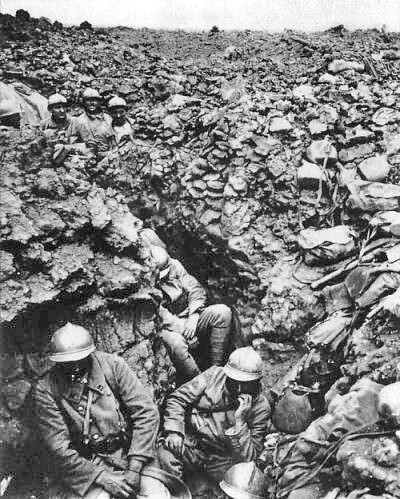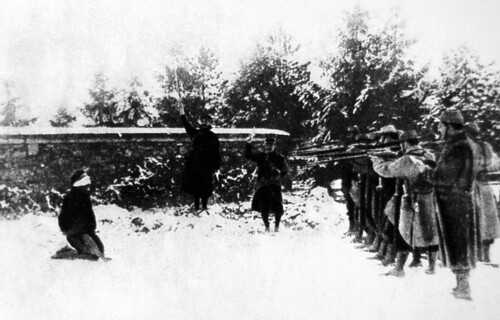The First World War was a bloody stalemate. The Entente nations, France and England, sent wave after wave of troops charging across No Man's Land against the entrenched German machine guns, only to have them mowed down in their thousands. In just the first hour of the Battle of the Somme, the British lost more troops than the Americans did in all of D-Day; at Verdun, the French Army was being lost in a deadly meat-grinder that took thousands of lives every day. It was mass slaughter on a scale that had never been seen before. All of Europe was ankle-deep in blood.
Then, in 1917, a remarkable thing happened--a huge portion of the French Army simply went on strike. They sat down in their trenches and flatly refused to carry out any more of the futile suicidal frontal assaults being ordered by their generals. The French Mutiny of 1917 was desperately hidden by the French and British governments, and the remarkable story remains little-known even today.
On April 16, 1917, French General Robert Nivelle, newly-appointed as Commander of the French Army, thought he was about to win the First World War. He was about to launch a massive assault at Chemin des Dames that, he confidently believed, was so well-planned and well-executed that it simply could not fail--indeed, even when Nivelle found out that German spies had already learned of his plans, he did not alter them. As planned, the French artillery sent a massive barrage of shells to tear up the enemy's trenches just before the French troops would reach them; as planned, over a million French troops left their trenches and went "over the top" to charge across No Man's Land. But instead of the expected massive breakthrough and victory, Nivelle watched as the still-remaining German machine guns opened fire, and killed or wounded 30,000 Frenchmen within hours. The Germans, knowing that the bombardment was coming, had temporarily retreated to their secondary trenches. The Entente artillery barrage blew apart empty trenches.
But Nivelle did not give up. Confident that the plan would still work if he only threw in some more troops, he called up his reserves and ordered them to the front. According to legend, when a unit of reinforcements found themselves marching past General Nivelle and his aides on their way to the frontline trenches, they protested by loudly bleating like sheep--they were lambs being led to the slaughter. By the time Nivelle relented and ended the attacks, ten days later, some 120,000 French troops lay dead or mangled in No Man's Land. The "Second Battle of the Aisne" was a failure.
For many in the French Army, it was the last straw. By this time, French troops had faced three years of mass human-wave attacks that charged across No Man's Land only to be cut down en masse by German machine guns and artillery. Names like "Ypres", "The Somme", "Verdun", "Vimy Ridge", and "Passchendaele" had already become synonyms for "futile mass slaughter".

French troops in the trenches
On May 3, 1917, the French Army's 21st Division was ordered to make ready for another attack. Instead, the troops of the 21st had a meeting, and informed their shocked commanders that they would not obey those orders. They would not abandon their positions or refuse to fight in defense, the troops declared, but they would not make any more suicidal charges across No Man's Land. The French Generals swiftly responded by arresting the troops' spokesmen, executing several and exiling the rest to Devil's Island. On May 5, the 21st Division went "over the top" and was cut to pieces.
The spark of mutiny spread quickly. The 120th Regiment announced that it would not make any more frontal assaults. The 119th and 128th quickly followed. By June, regiments from at least 50 of the 113 infantry divisions in the entire French Army were part of the mutiny. On June 5, when the 5th Regiment was ordered to the front, they refused, and began marching to the rear instead. Met by a group of French Army officers who blocked their way, they simply sat down on the road in protest. The troops of the 18th Regiment, after receiving orders to attack, told their Colonel that they had nothing against him personally, but they would not follow those orders. Another French unit sent a written message to their commander: "You have nothing to fear, we are prepared to man the trenches, we will do our duty and the Boches will not get through. But we will not take part in attacks which result in nothing but useless casualties." The French troops did not resist with violence or threaten their officers--instead, they simply sat down in their trenches and refused to go over the top.
As the rebellion spread, the list of grievances quickly grew--not only were men refusing to make any more suicidal attacks, but they wanted an opportunity for regular leave (although officers were given leave to visit Paris, most of the poilus in the trenches had not had any leave in three years), and they wanted better food and water. In some units, the demands became more overtly political and aimed at ending the war itself; some groups of soldiers were defiantly flying the red flag and singing "The Internationale" and "The Marseillaise". Troops from the 119th Regiment stole a truck, mounted machine guns on it, and were stopped on their way to destroy the ammo dump as a protest against the war. Another regiment took over the town of Missy-aux-Bois and tried to declare a new "Commune" government. Several divisions formed elected "Soldier's Councils" in direct imitation of the Bolshevik "Soviets". Far from being mere grousing and complaints by small disgruntled groups of troops, the mutiny was becoming organized, with regiments and divisions acting together as units and with clear aims and discipline.
The French and British governments were absolutely terrified--the Russian Tsar had just been deposed less than three months before by a Revolution which had also begun with mutinous Army troops. Civilian politicians feared that a full-scale revolution would break out in France; military generals feared that if the Germans found out about the mutinies they would launch a full-scale attack and the entire war could be lost. The British were afraid that the entire French Army was now unreliable, and that they might be left to face the Germans alone. So both governments made tremendous efforts to suppress the mutiny and, above all, to keep the whole thing quiet. (After the war, German General Ludendorff confirmed that the Kaiser's High Command had never had any inkling of the French Army rebellions--and if they had, it might have changed the course of the war.)
To end the mutiny, the French Government used both the carrot and the stick. As the carrot, the government fired Nivelle and replaced him as Commander with the more popular General Petain. Petain implemented a system of regular leave for the troops, increased the rate at which frontline troops were rotated out of the trenches, made efforts to improve the food and water they got, and promised that there would be no more mass frontal assaults until large numbers of troops from America (who had just joined the war) began to arrive to help.

One of the mutiny leaders is shot by firing squad.
As the stick, the military carried out a series of mass arrests targeting the mutineers. Of the tens of thousands who were arrested, about 23,000 were convicted in a court-martial. Some 500 of these were formally sentenced to death, but Petain wanted to try to smooth things over with the troops, so only 50 or so of the death sentences were actually carried out--the rest were imprisoned. But the mutiny did not really end until the Germans launched their Great Offensive in early 1918, in an attempt to win the war before large numbers of American troops began arriving.
The entire history of the mutiny was quietly erased. It was classified as a military secret, references to it in official documents were either excised entirely or euphemized as "isolated incidents" of "indiscipline". Today, few people know of the existence of the French Mutiny--and fewer still realize how sweeping it actually was in its scope and extent.


